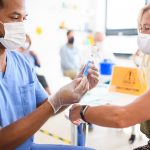
(NaturalHealth365)
$26 billion: that’s how much money Pfizer expects to make in 2021
thanks to its COVID shot, accounting for more than one-third of the
pharmaceutical giant’s sales.
But even as Pfizer reportedly plans to file for full FDA approval of its experimental drug this month, doctors and individuals are beginning to raise serious questions over the possibility that this experimental drug could be shedding or causing harm to people who are choosing to remain shot-free, including severely altered menstruation.
What we know about viral shedding — from natural infections and injections
Viral shedding of SARS-CoV-2, the virus that causes COVID-19, happens when the virus is released from an infected person’s body via sneezing, coughing, breathing, or speaking. The shed virus can then spread from person to person.
It’s a well-established phenomenon that injections containing live yet weakened versions of viruses can also shed. For example, the U.S. Centers for Disease Control and Prevention (CDC) states
on their website that shedding is “common” with the live attenuated flu shot.And a 2012 paper published in Pediatrics Child Health admits to the circulation of a “vaccine-type measles virus,” adding to a growing suspicion that the mumps-measles-rubella (MMR) injection itself may drive some measles “outbreaks.”
Anecdotal evidence points to altered periods, other unusual symptoms in people who haven’t received the experimental COVID shot (but are around people who have)
During the COVID-19 pandemic, thousands of unvaccinated people share alarming anecdotal experiences about unusual health problems after being around people who have received the experimental COVID shots, including severely altered menstruation cycles, miscarriages, and COVID-19 symptoms and/or positive test results. In light of this, a question has been circulating:
Do NOT ignore the health dangers linked to toxic indoor air. These chemicals - the 'off-gassing' of paints, mattresses, carpets and other home/office building materials - increase your risk of nasal congestion, fatigue, poor sleep, skin issues plus many other health issues.
Get the BEST indoor air purification system - at the LOWEST price, exclusively for NaturalHealth365 readers. I, personally use this system in my home AND office. Click HERE to order now - before the sale ends.
Can the COVID shot harm people who haven’t received it?
Current medical consensus states that shedding cannot happen from injections that do not contain a live virus, as is the case with the mRNA COVID shots from Pfizer and Moderna. And although the Johnson & Johnson shot contains live versions of an adenovirus, the adenovirus reportedly can’t replicate, and therefore the shot allegedly unable to shed.
Despite these assurances, questions remain. For a thorough discussion about this topic from a podcast with informed consent proponents Dr. Carrie Madej, Dr. Lee Merritt, and Dr. Christiane Northrup, click here.
Overall, there is not enough data yet to confirm whether COVID shots can shed. Current (conventional) scientific evidence suggests not. But the overwhelming amount of personal stories that suggest something else is going on just should not be overlooked and so swiftly downplayed — not when the drugs are still in their experimental phases.
After all, since the Big Pharma companies have not disclosed all the ingredients they used in their experimental drugs, it’s not outside the realm of possibility that something in the COVID shots could be causing harm to unvaxxed individuals.
For instance, a preprint study from March 2021 released on BioRxiv found that antibodies to the SARS-CoV-2 spike protein are being detected in the saliva of mRNA shot recipients. This presents the possibility that these antibodies are spreading to others from vaxxed people and affecting their health.
Pfizer also reportedly used strands of the bacteria E. coli to make the shot, and it’s unknown if there are any residual bits of E. coli in the final product.
As with many things about the pandemic, time will tell. Stay tuned, as we continue to monitor this issue very closely.
Sources for this article include:
Rumble.com
Finance.Yahoo.com
TGHN.org
Nebraskamed.com
Mayoclinic.org
NIH.gov
Montanadailygazette.com
CDC.gov
Biorxiv.org
Northwestern.edu
No hay comentarios:
Publicar un comentario